Death is looming over third-party cookies. Google plans to phase them out of its browser in the second half of 2024. Safari and Firefox already block third-party marketing cookies. And starting with iOS 14.5, Apple now requires apps to ask users’ consent to track their activities elsewhere.
It’s time to shift to first- and zero-party data. A customer data platform (CDP) will help you centralize all data you have for a specific customer from multiple sources like your website, social media, and mobile app.
Choosing the best customer data platform for your ecommerce business is easier said than done. Should you build a custom one or buy an off-the-shelf solution? If you opt for the latter, what should you pay attention to in your selection process?
Let us help you cut through the noise and find the perfect CDP for your organization. As an ecommerce consulting agency, we at Elogic have long been at the forefront of innovation in ecommerce, helping businesses like yours select the right vendors and integrate solutions into their digital ecosystems.
Read on to find a comprehensive customer data platform vendor comparison, along with a guide on how to choose a CDP.
| CDP vendor | Key strengths | Pricing | Brands using a CDP |
|---|---|---|---|
| Adobe Customer Data Platform | – B2C, B2B, and B2P editions available – AI-driven predictive analytics – Seamless native integration with Adobe software ecosystem | On-demand | Henkel, Coles, Panera Bread, The Home Depot, Major Baseball League |
| Salesforce CDP | – Native integration with Salesforce Customer 360 – Powerful embedded AI tool, Salesforce Einstein – Extensive customization options | Corporate: $12,500 per org per month Enterprise: $50,000 per org per month Enterprise Plus: $65,000 per org per month | Bank of Montreal, Boston Scientific |
| Bloomreach Engagement | – CDPR and ISO certifications – 90+ pre-built connectors – Plug-and-play use cases | On-demand | Financial Times, Next, Yves Rocher, Kiwi.com, River Island |
| SAS Customer Data Platform | – A wide range of supported customer data types – Dynamic customer segmentation – No need to lift and shift data into the CDP to use it | On-demand | Vodafone, Globe Telecom, Ulta Beauty |
| Microsoft Customer Data Platform | – Advanced report preparation and automation features – Custom ML models for targeting specific questions – Full integration with other Microsoft products | $1,500 per tenant/month Customer Insights profiles add-on: $1,000 per tenant/month Customer Insights accounts add-on: $1,000 per tenant/month | UNICEF, Campari, Investec, Chipotle, AEP Energy |
| Treasure Data | – Can handle massive amounts of data – Extensive customizability options – Responsive support team | On-demand | Yamaha, Mattel, Canon, LG, Fujitsu |
| Tealium | – Multiple data privacy and security certifications – 1,300+ turnkey integration options for pulling customer data – Powerful behavior prediction capabilities | On-demand | Kmart, Expo 2020 Dubai, TUI, Bosch, Epson |
| Twilio Segment | – Advanced automation capabilities – Affordable pricing for SMEs – Allows executing custom functions and integrations | Free: $0/month Team: starts at $120/month Business: custom | Domino’s, Levi’s, Staples, Intuit, DigitalOcean |
| Sitecore | – Powerful real-time insight and segmentation features – Data-driven content determination – In-built GDPR compliance | On-demand | Emirates, HIA, Coates, Jetstar |
| Optimove Real-Time CDP | – AI-powered smart campaign orchestration engine – Extensive automation capabilities – Advanced micro-segmentation and customer journey personalization features | On-demand; three plans available | Papa John’s, Family Dollar, Entain, John Hardy, Bet365 |
| Optimizely | – Ease of use and setup – Extensive automation features – Easy integration with third-party platforms | On-demand | Tea Forte, Fox-Rent-A-Car, Audiogon, Helix Sleep, Strut This |
| Emarsys | – Advanced marketing automation features – Handles large data volumes – Industry-specific solutions available for ecommerce, retail, and travel businesses | On-demand | Puma, Happy Socks, Pizza Hut, Nike, Babbel |
| Acquia | – Intuitive user interface with a drag-and-drop editor – Extensive filtering options – Modern SaaS architecture enabling high scalability | On-demand | Moosejaw, Arcelik, Lids, Clarks, MCM Worldwide |
What Is CDP?
A customer data platform is a software tool aggregating customer data from multiple sources, organizing it, and creating comprehensive customer profiles. It resolves one key problem retailers struggle with: unifying customer data fractured across multiple siloed systems.
CDPs vary in functionality. Some just collect and unify customer data; others have in-built data analytics on top of that.
Any CDP pulls data from multiple sources, both online and offline. The data is linked to an existing or newly created cross-device customer ID. This data aggregation and organization creates a single customer view, a necessary prerequisite for personalization at scale (given you have omnichannel commerce in place).
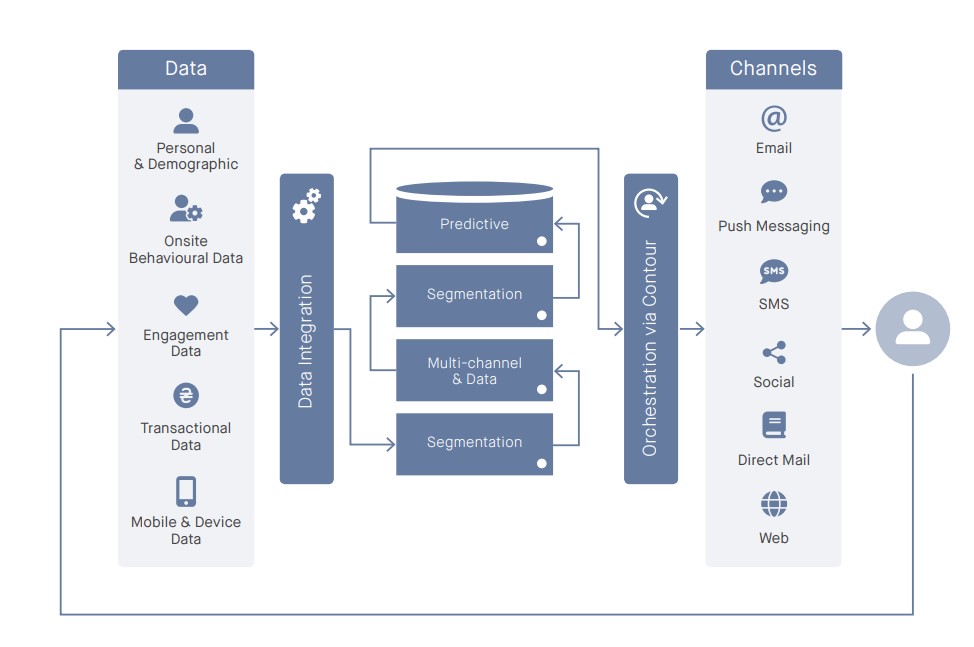
CDPs rely on first-party data, i.e., the data you collect directly from your customers. It can include:
- Personal data (name, contact details, demographics, occupation)
- Engagement data (page visits, search queries, newsletter open rates, customer support interactions)
- Behavioral data (order history, device use, loyalty program activity, cart abandonment information)
- Attitudinal data (customer feedback, reviews, sentiment expressed on social media)
Finding the One: Pre-Built Customer Data Platform Comparison
With the customer data platform market size projected to grow by 28.2% from 2022 to 2028, the market is saturated with tools for any taste. No wonder so many merchants struggle to find the right fit for their business.
Here’s the list of 13 customer data platform tools with their pros, cons, and use cases to make your life easier.
Adobe Customer Data Platform: Best for Adobe Commerce users
G2 rating: N/A
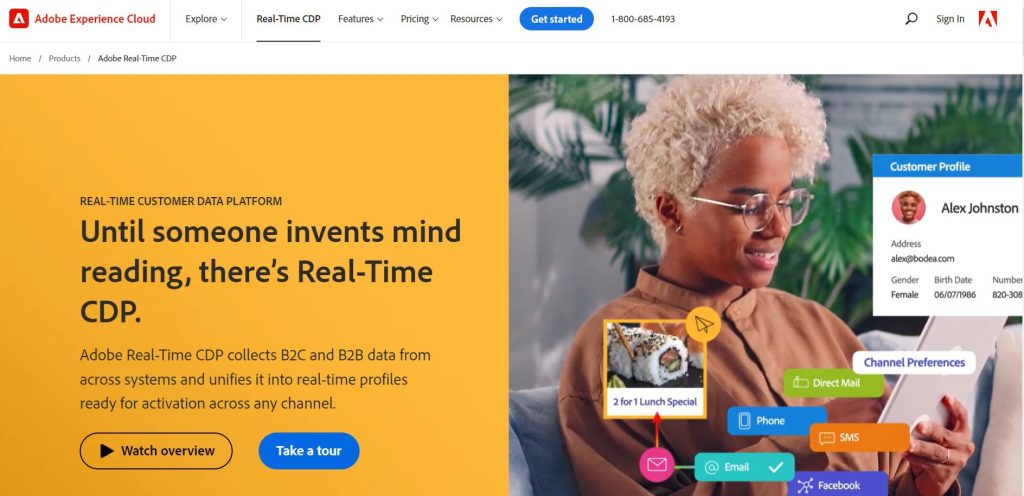
Adobe Real-Time Customer Data Platform is a midsize CDP (between $20 and $75 million in annual revenue) focused on data orchestration for marketing purposes. Ideal for enterprises that already rely heavily on Adobe products (e.g., Adobe Commerce), this real-time customer data platform primarily targets manufacturing, financial services, and retail businesses.
Read more: Adobe Commerce (Magento) Pricing Explained
Pros:
- Real-time profile creation and personalization at scale support
- B2C, B2P, and B2B customer data platform editions
- Segment sharing across multiple brands
- AI-driven predictive analytics
- Seamless native integration with Adobe software ecosystem
Cons:
- Involves a steep learning curve
- Adobe offers premium-priced products, which translates into higher TCO
- Pricing available only on-demand
Adobe Customer Data Platform is used by businesses like Henkel, Coles, Panera Bread, The Home Depot, and Major Baseball League.
Salesforce CDP: Best for Salesforce CRM users
G2 rating: 4.4/5 (based on 37 reviews)
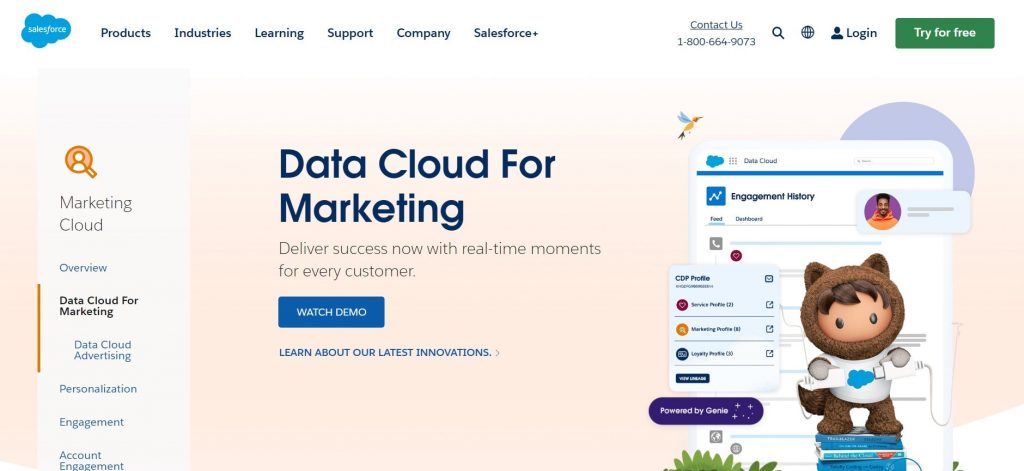
Another midsize customer data platform (Forrester) on this list, Salesforce CDP, also focuses on data orchestration. Its vertical market focus is on businesses in retail and consumer goods, financial services, and healthcare and life sciences.
Salesforce CDP is perfect for businesses that already rely on other Salesforce products. A version of Salesforce CDP is available as a part of its CRM, Customer 360, while the full-fledged CDP is a part of the Marketing Cloud. If that seems a tad confusing, check out our guide on Salesforce products and pricing.
Pros:
- Native integration with Salesforce CRM, Customer 360
- Powerful embedded AI tool, Salesforce Einstein, helpful for customized mass messaging
- Extensive customization options
Cons:
- Steep learning curve with little training support from Salesforce
- Vendor lock-in
- Semi-transparent pricing as there are add-ons and upgrades available at additional cost
Salesforce CDP is used by Bank of Montreal and Boston Scientific.
SALESmanago: Best for AI-driven omnichannel marketing
G2 rating: 4.4/5 (based on 248 reviews)
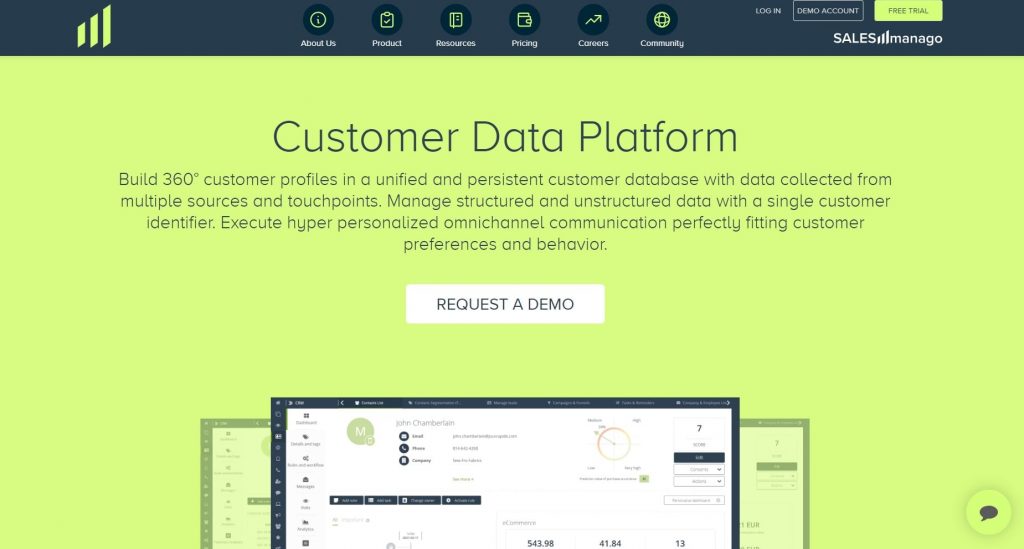
SALESmanago is a Customer Engagement Platform with a built-in CDP for mid-sized businesses. It allows you to build 360-degree views of a customer profile with structured and unstructured data from multiple sources and touchpoints.
Elogic is an official partner of SALESmanago, so feel free to reach out in case you’re interested in integrating the software with your online store.
It also takes customer privacy seriously and allows you to create authentic customer relationships based on zero- and first-party data. The system leverages AI and machine learning algorithms to analyze customer data.
Pros:
- Extensive functionality with a wide range of tools for web personalization, customer segmentation, automated email campaigns, lead nurturing, etc.
- Excellent customer support ready to respond to fast to queries
- Affordable pricing, 30-day free trial
Cons:
- Complicated training materials and tutorials, which might be a challenge during onboarding
- Slightly unintuitive UX, which is in the process of improving
Some on the world-know retailers are using SALESmanago, including Vodafone, Lacoste, New Balance, and Victoria’s Secret.
Bloomreach Engagement: Best for SMEs looking for a B2C customer data platform
G2 rating: 4.7/5 (based on 454 reviews)
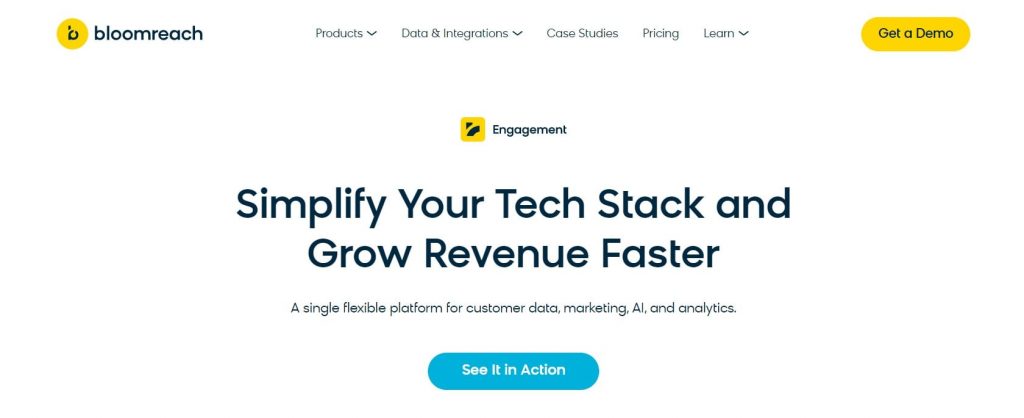
Bloomreach Engagement (formerly Exponea) is a midsize automation CDP targeting the retail, financial services, telecom, and hospitality industries. According to Gartner customer data platform reviews, Bloomreach Engagement stands out for its ease of use and analytical capabilities.
G2 data reveals that this CDP targets mid-market (46%) and small businesses (31%). Combined with ease of use, Bloomreach Engagement is a solid customer data platform for small business.
Pros:
- CDPR and ISO certifications
- 90+ pre-built connectors (e.g., Facebook Ads, Google Analytics)
- Ease of use
- Plug-and-play use cases
- Faster results thanks to real-time analytics combined with engagement automation
Cons:
- No free trial, and pricing available only on-demand
- A potentially overwhelming variety of features for new users
- Complex merchandising integration may be challenging
Financial Times, Next, Yves Rocher, Kiwi.com, and River Island are some examples of businesses that use Bloomreach Engagement.
SAS Customer Data Platform: Best for large enterprises
G2 rating: N/A
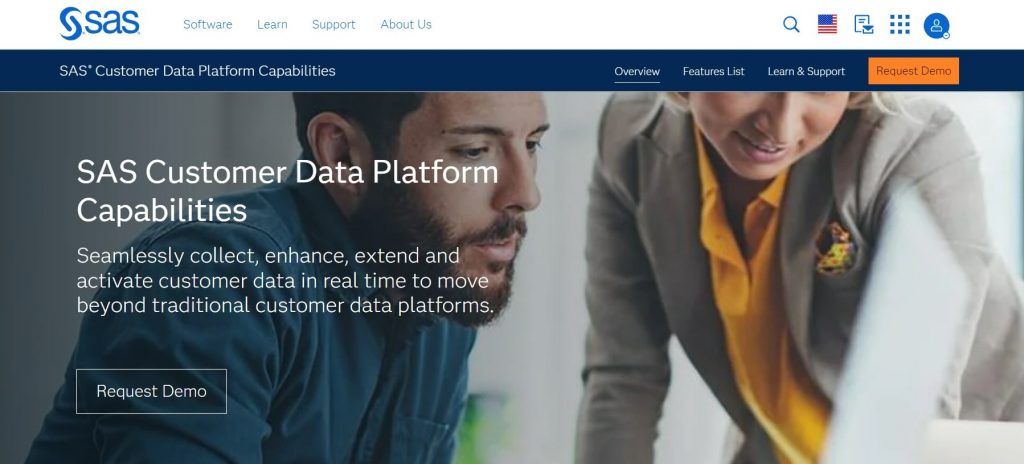
SAS CDP is an established large player in the field, bringing in over 75$ million in annual revenue. Its primary functionality concerns automation, allowing users to streamline customer marketing campaigns.
SAS CDP is a leading customer data platform for large businesses in financial services, communications, and retail that deal with huge amounts of data and diverse data types. You will also benefit from it if you want to avoid unnecessary, risky data migrations.
Pros:
- Solid omnichannel data collection and processing features with a wide range of supported customer data types
- Dynamic customer segmentation based on real-time data
- No need to lift and shift data into the CDP to use it
Cons:
- High upfront costs which make it inaccessible for SMEs
- Strong tech skills required for use
- Pricing available only on-demand
SAS CDP is used by Vodafone, Globe Telecom, and Ulta Beauty, to name a few.
Microsoft Customer Data Platform: Best for enterprises in need of customer insights
G2 rating: 4.0/5 (based on 18 reviews)
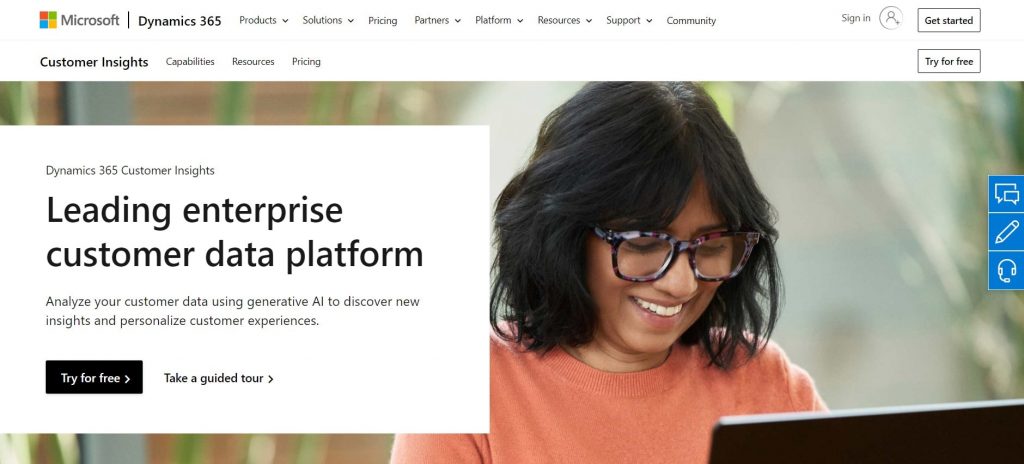
Microsoft’s CDP, Dynamics 365 Customer Insights, is quite straightforward. It acts primarily as a measurement CDP, meaning its purpose is to deliver insights into your data. Named a contender among the best customer data platform software according to G2’s grid, Microsoft CDP serves the retail, healthcare, and financial services industries.
Microsoft Dynamics 365 Customer Insights is a good choice for large enterprises that strive to gain insights into customer behavior from mountains of data. You should especially consider it if you already rely on Microsoft products, like Microsoft Azure, in your operations or if you’re looking for AI capabilities for ecommerce.
Read more: Machine Learning and AI in Ecommerce: Benefits & Use Cases
Pros:
- Advanced report preparation and automation features
- Out-of-the-box AI features powering marketing suggestions and report generation
- Custom ML models for targeting specific questions
- Full integration with other Microsoft products
Cons:
- Limited integrations with third-party platforms
- Tedious data pulling
- Limited data space
Microsoft Customer Data Platform is used by organizations like UNICEF, Campari, Investec, Chipotle, and AEP Energy.
Treasure Data: Best for enterprises with high data volumes
G2 rating: 4.5/5 (based on 81 reviews)
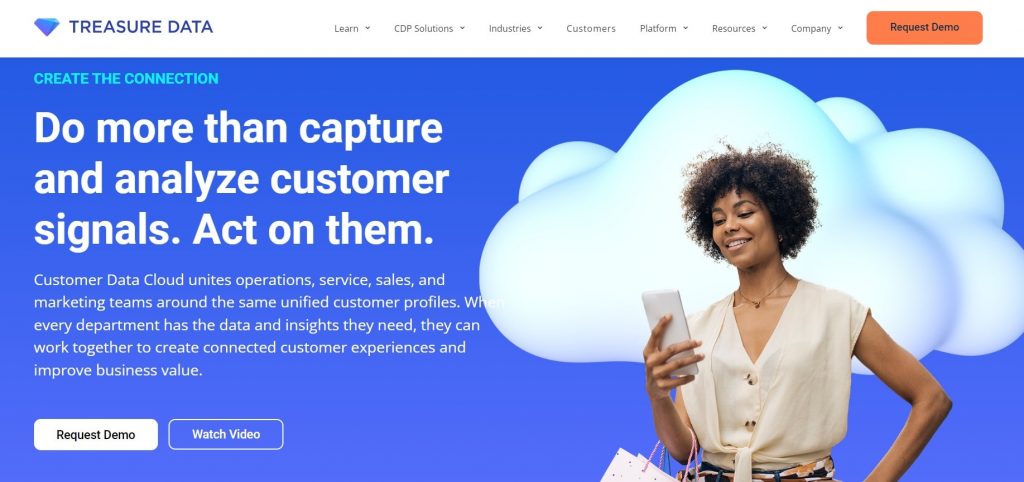
Another large player in the CDP industry, Treasure Data CDP is a measurement tool. It primarily caters to the needs of large and fast-growing businesses who need to capture billions of rows of data at scale and process it in an efficient manner. Besides, it’s one of the few open-source customer data platforms, so you can you can access the code and tweak it whenever needed.
You will benefit from Treasure Data if you have to deal with high data volumes and need it to be a true source of record for all of your customer data. You should be ready to invest resources into tweaking the CDP to your needs though.
Pros:
- High uptime and fast response time
- Can handle massive amounts of data
- Seamless integrations via APIs
- Extensive customizability options
- Responsive support team
Cons:
- Internal technical resources required since some features will need technical customizations to fit the business use cases
- Debugging issues and unintuitive UI
- Pricing available only on-demand
Household names like Yamaha, Mattel, Canon, LG, and Fujitsu chose Treasure Data as their CDP.
Tealium: Best for large enterprises looking for a real-time CDP
G2 rating: 4.4/5 (based on 132 reviews)
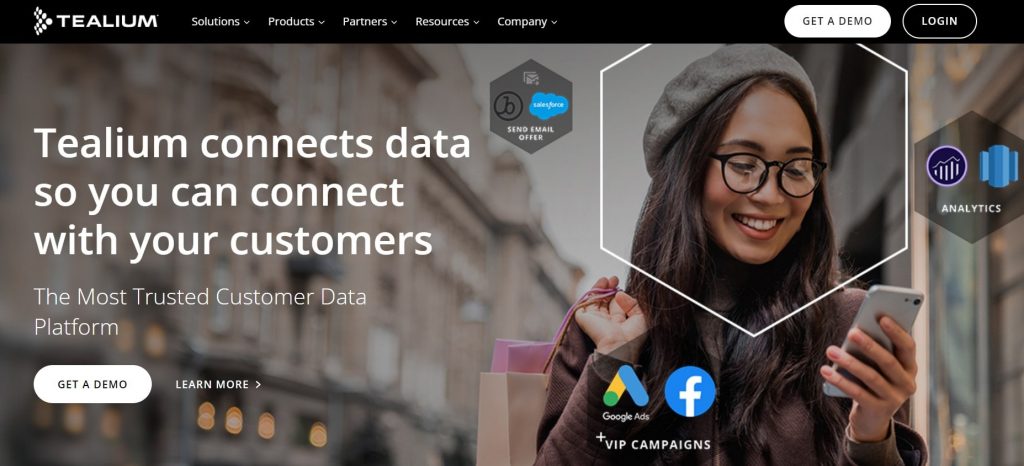
Tealium’s AudienceStream CDP is an orchestration tool that helps medium (25%) and large (75%) enterprises coordinate omnichannel marketing and customer engagement.
Powered by machine learning (ML) technology, Tealium CDP is a perfect option for large enterprises looking to gather data insights in real time from multiple sources. You can even pull up real-time analytics and optimize your advertisements, customer engagement, and the helpdesk.
Pros:
- Multiple data privacy and security certifications (HIPAA, ISO 27001 and 27018, SSAE18 SOC 2 Type I & II)
- 1,300+ turnkey integration options for pulling customer data (e.g., Salesforce, Adobe, Google)
- Powerful personalization at scale features thanks to behavior prediction
Cons:
- A somewhat steep learning curve
- Initial integration can be time- and resource-consuming
- Troubleshooting issues can be challenging
- Pricing available only on-demand
Kmart, Expo 2020 Dubai, TUI, Bosch, and Epson chose Tealium for their CDP needs.
Twilio Segment: Best for real-time personalization at scale for SMEs
G2 rating: 4.6/5 (based on 502 reviews)
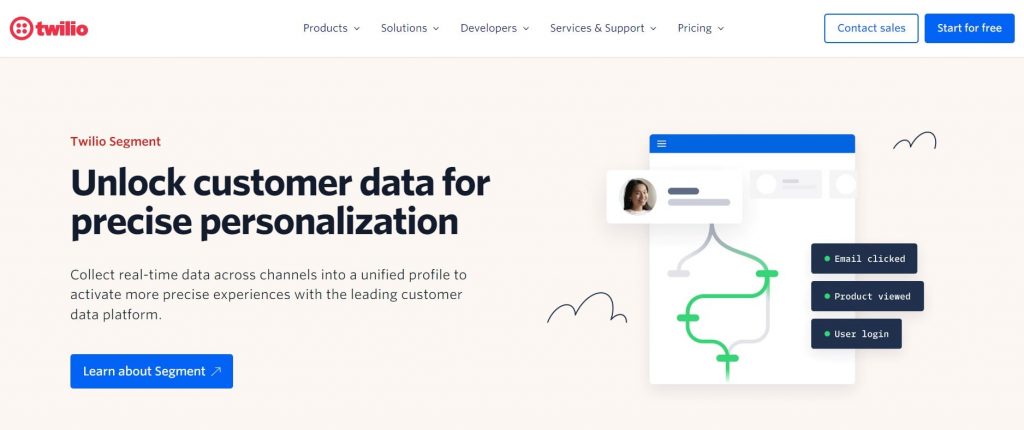
Acquired by Twilio in 2020, Segment is a data management CDP serving clients in manufacturing, financial services, and entertainment. Segment is also one of the rare best free customer data platform software: it has a free plan, though limited to two data sources.
The free plan is its main advantage; it allows startups and small businesses to integrate a CDP at no cost. The lower-tier plan comes with transparent pricing that’s affordable for SMEs as well. This makes Segment a must-consider for SMEs that can’t afford to divert a big chunk of their revenue to a real-time CDP.
Pros:
- A free plan and free trial are available
- 400+ sources of data supported out-of-the-box
- Extensive automation of trigger and sequence features
- Affordable pricing for SMEs
- Allows executing custom functions and integrations
Cons:
- May require coding to accomplish certain tasks
- Limited exclusion audience capabilities
- Certain features are available only in paid tiers
Twilio Segment’s users include Domino’s, Levi’s, Staples, Intuit, and DigitalOcean.
Sitecore CDP: Best for content-heavy websites
Gartner rating: 4.3/5 (based on 69 ratings)
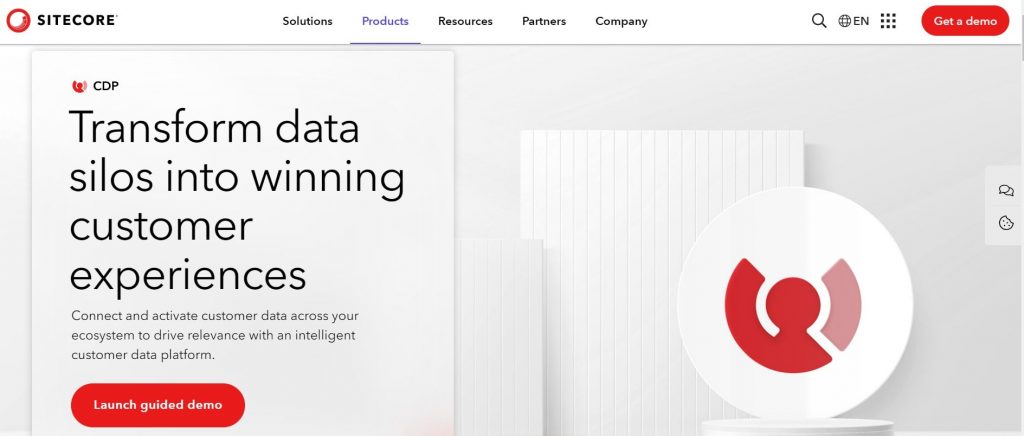
Sitecore offers a midsize orchestration CDP primarily for clients in travel and hospitality, financial services, and retail. As a part of its Engagement Cloud, this CDP’s key strengths lie in powering highly personalized omnichannel customer experiences through content.
Sitecore CDP is available as a standalone product which is not subject to a vendor lock-in. Its decisioning engine powered by real-time segmentation also makes this CDP stand out.
Pros:
- Solid customer data platform B2B functionality
- Powerful real-time insight and segmentation features
- Data-driven content determination
- In-built GDPR compliance
Cons:
- Pricing available only on-demand
- Steep learning curve
- Backend integration can be time-consuming
Sitecore CDP is used by Emirates, HIA, Coates, Microsoft, and Jetstar.
Optimove Real-Time CDP: Best for predictive segmentation for SMEs
G2 rating: 4.6/5 (based on 100 reviews)
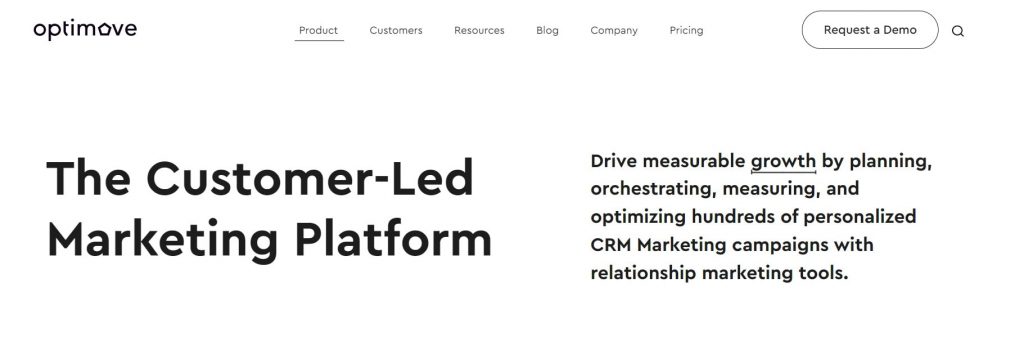
Optimove is a midsize automation CDP serving clients in retail, gambling, gaming, and financial services. This solution is a solid option for SMEs looking to launch predictive segmentation in their operations. Its UI is also superintuitive, allowing marketing teams to easily navigate through planned campaigns, analyze and improve them.
Pros:
- AI-powered smart campaign orchestration engine powered by real-time and historical data
- Extensive automation capabilities
- Advanced micro-segmentation and customer journey personalization features
- Powerful multichannel decisioning features
Cons:
- Pricing available only on-demand, with add-ons costing extra
- Steep learning curve, tedious setup process
Optimove real-time CDP users include Papa John’s, Family Dollar, Entain, John Hardy, and Bet365.
Optimizely Data Platform: Best for small and mid-sized ecommerce businesses
G2 rating: 4.3/5 (based on 51 reviews)
Optimizely is one of the top small CDPs out there (<$20 million in annual revenue) with automation being the core functionality of it. Formerly known as Zaius, this customer data platform vendor serves clients in retail, finance, and consumer packaged goods.
Optimizely CDP is a great fit for ecommerce SMEs that are looking for a real-time CDP with powerful automation features. It uses a neural network to predict shopping intentions, providing a solid ground for improving personalized marketing campaigns’ efficiency.
Pros:
- Ease of use and setup thanks to an intuitive user interface
- Extensive automation features
- Easy integration with third-party platforms
Cons:
- Pricing available only on-demand
- Creating multiple wildcard exclusions can be challenging
- A somewhat steep learning curve
- Integration with Shopify may be challenging
Optimizely is used by Tea Forte, Fox-Rent-A-Car, Audiogon, Helix Sleep, and Strut This.
Emarsys: Best for automating omnichannel engagement at scale
G2 rating: 4.3/5 (based on 376 reviews)
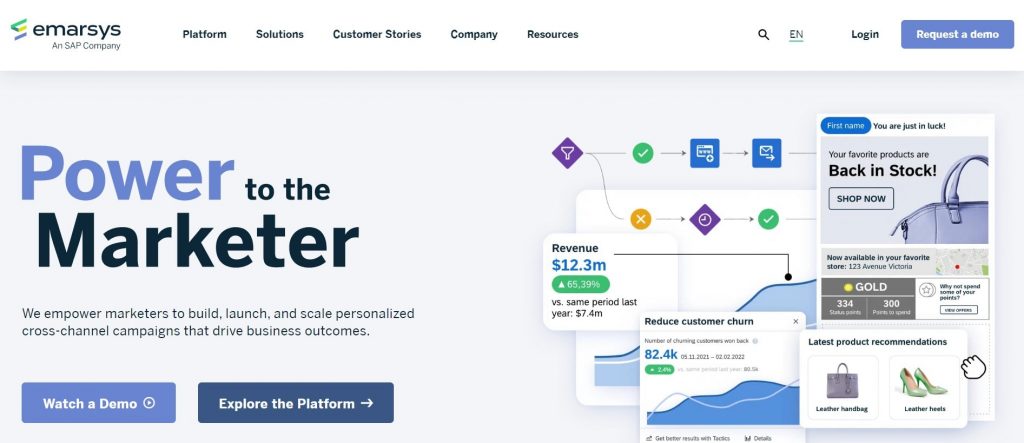
Acquired by SAP, Emarsys CDP shines in automating highly personalized customer engagement for its 1,500+ clients worldwide. Gartner recognized Emarsys as a Leader in personalization four years in a row for their 1:1 omnichannel engagements, privacy compliance, and omnichannel functionalities.
Pros:
- Advanced marketing automation features
- AI-powered predictive analytics and customer journey planning
- Handles large data volumes well
- Industry-specific solutions available for ecommerce, retail, and travel businesses
Cons:
- Pricing available only on-demand
- Steep learning curve
- Limited reporting features
You can find Puma, Happy Socks, Pizza Hut, Nike, and Babbel among Emarsys users.
Acquia: Best for SMEs planning for growth
G2 rating: 3.9/5 (based on 80 reviews)
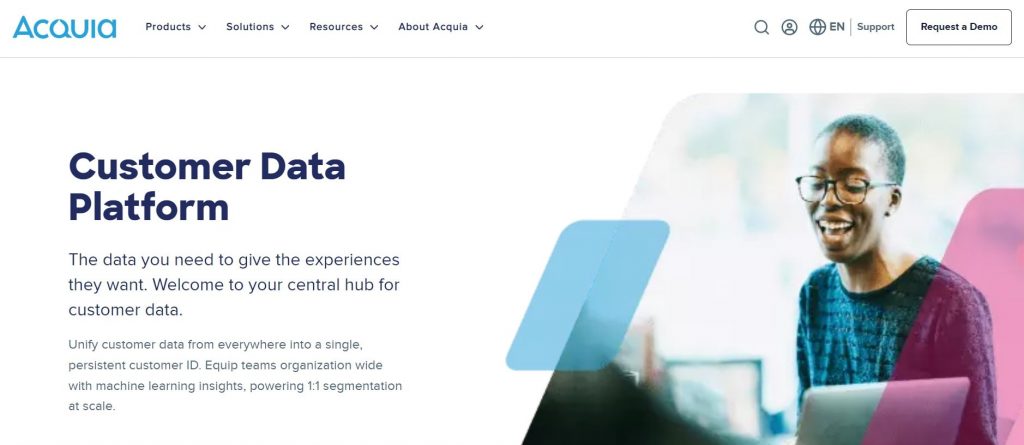
Acquia is a midsize measurement CDP that primarily serves SMEs in retail, consumer packaged goods, and publishing. Its purpose is to help users make sense of large pools of data fast. For example, Acquia can help you explore the factors behind such complex trends as customer lifetime transaction count.
Pros:
- Intuitive user interface with a drag-and-drop editor
- Extensive filtering options
- Able to handle huge data volumes
- A wide range of pre-built attributes
- Extensive customization features
- Modern SaaS architecture enabling high scalability
Cons:
- Pricing available only on-demand
- Limited reporting automation features
- Troubleshooting can be challenging because of vague error messages
Acquia is used by businesses like Moosejaw, Arcelik, Lids, Clarks, and MCM Worldwide.
How to Choose a Customer Data Platform – And Not Regret It
Here are the four steps to settle for the perfect CDP for your business.
Get a stakeholder buy-in
Change resistance can easily undermine your efforts in your CDP adoption efforts. To avoid it, you need to bring all stakeholders on board early on. Those include representatives from:
- IT
- Marketing
- Legal
- Customer service
- CDP implementation partners
- External consultants
When you involve stakeholders in the planning, your mission is to pinpoint their needs in detail. Once you do, you’ll be able to define your requirements for a CDP system. Stakeholder involvement also mitigates resistance to change and facilitates the tool’s adoption within the organization.
Define your why and your business needs
Why are you looking into buying a CDP now? Find the answer to this question to understand what purpose it should serve in your organization.
Your CDP should align with your business’s strategic needs, too. So before comparing the vendors on our customer data platform list, you need to pinpoint your business use cases:
- Gain a full, detailed understanding of the customer journey
- Introduce personalization at scale
- Combine online and offline data to improve customer experience
Read more: How to Unlock the Benefits of Personalization at Scale
You will also need to assess the complexity of implementing a CDP at your organization to define the scope of work during project planning. This is where evaluating your digital maturity comes in. It’s determined by:
- The condition of your legacy systems
- The technical debt you’ve accumulated
- Current customer data collection, processing, and quality
- Digital literacy of your employees
Identify potential app integrations
Your CDP should be seamlessly integrated with both the data sources and your tech stack. The data sources can include your CRM, web analytics tools, mobile apps, marketing hubs, etc. As for your existing IT infrastructure, consider the marketing, sales, and customer support tools that may benefit from a single customer view.
Once you identify all the applications your CDP has to work with, determine how to implement each integration. Most CDPs come with pre-built integrations that use APIs to ingest data from silos into the CDP repository.
Remember to consider both the functional and non-functional requirements for integrations. The functional requirements concern the exact apps you need the CDP to be integrated with. The non-functional ones include performance, security, maintainability, scalability, and usability.
Compare CDP vendors
Now that you are ready to shop around for your perfect CDP, compare them against your feature and integration requirements. During this stage:
- Consider your industry and business type and look into CDPs that specialize in serving clients similar to you.
- Look into vendors’ track records in similar use cases by studying success stories and case studies.
- Ask for input from stakeholders on the buying decision – or at least keep them in the loop.
As for the pricing, don’t hesitate to create and send out an RFP (request for proposal) to your shortlisted vendors. As you can see, many customer data platform companies provide pricing only upon request. But don’t compare vendors based solely on costs: consider the ROI, instead.
Custom CDPs: Pros & Cons
If you don’t find an off-the-shelf solution matching your needs, you may decide to build a custom one. Here are four pros of this approach:
- Total control over customer data platform features. The customer data platform you get will be tailored to your specific needs. So, you won’t have to overpay for features you don’t use or compromise on certain integrations.
- No licensing costs. Once you receive your custom CDP, you don’t have to pay a third party to use it.
- Complete ownership over the CDP. It allows you to develop and launch new customer data platform capabilities as necessary, reducing the risk of outgrowing your CDP.
However, custom CDP development isn’t without its cons:
- High upfront costs. Custom development entails a significant upfront investment as you need to hire a development partner or in-house team and pay for their services.
- No plug-and-play. Development takes time, from the discovery stage and identifying deliverables to testing and rollout. You may have to wait months for the tool – and you’ll have to invest a lot of effort in the project, too.
- Continuous maintenance costs. Once the development is over, your spending isn’t. You’ll still need a development partner or an in-house team to maintain the solution, update it, and adapt it to new use cases.
Takeaways – What’s the Best Customer Data Platform for Ecommerce?
The definition of the best customer data platform depends on the specifics of your business. A tool that suits large enterprises will probably be too overwhelming and costly for ecommerce startups. And a CDP for SMEs will be too constricting and slow for large companies.
That’s why you need to assess your current personalization goals and needs first.
But once you do, you may realize you lack the expertise required for choosing, integrating, and adjusting a CDP in-house. In this case, you can decide to turn to an integration partner for support.
Elogic would be honored to lend you our CDP expertise. We help leading retailers choose the best CDP to achieve their personalization goals and smoothly integrate it with their operations. Contact us to discuss how we can help you make the most out of customer data platforms.
Let us help you choose and integrate the perfect CDP for your needs
Request a consultationCustomer Data Platform FAQs
What is a customer data platform (CDP)?
A customer data platform is a tool that aggregates customer data from multiple sources and organizes it into individual customer profiles. Off-the-shelf customer data platform examples include Adobe CDN, Microsoft Customer Data Platform, SAP Customer Data Platform, Bloomreach Engagement, and Google Customer Data Platform among others.
How do customer data platform solutions work?
A customer data platform pulls general, historical, and real-time data from multiple sources using webhooks, APIs, and built-in connectors.
A CDP aggregates data from online and offline sources and links it to the corresponding customer ID. This allows for creating a single customer view (SCV) that unifies every customer’s activity across all touchpoints. An SCV is a prerequisite for implementing personalization at scale in omnichannel commerce businesses.
Which customer data platform vendor is right for your business?
Here’s how to choose a CDP that meets your needs:
- Involve stakeholders early on to identify which capabilities your organization requires and for which processes – and ensure an organization-wide buy-in.
- Define your needs (use cases, data types and sources, and business processes involved) before comparing CDP solutions.
- Determine which third-party apps the CDP has to be integrated with and how you can execute it (e.g., APIs).
- Evaluate, compare, shortlist, test, and pick customer data platform vendors based on your outlined selection criteria.


